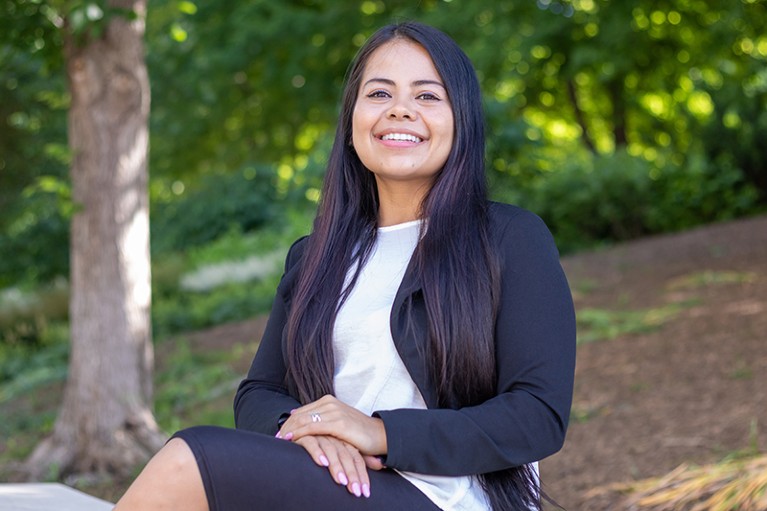

Researching the institutions you’re applying for can help you personalize your application.Credit: Getty
Academic careers are meant to follow a set trajectory: PhD student, postdoctoral researcher, tenure-track job. But when we were thinking about what to do after our PhDs, we decided to skip the postdoc stage and go straight for tenure-track jobs owing to visa restrictions (Q.L., an international student at the time) and financial considerations (V.R., who had the looming pressure to pay student loans while supporting a family). Our mentors and peers were sceptical. A faculty member advised one of us (Q.L.) against it. Even we weren’t sure we could do it — but we did. By the end of our PhDs, we had received 15 tenure-track offers between us.
At a professional-development workshop, we were able to tell the discouraging faculty member that we would be starting our laboratories, not working as postdocs. His response — “I guess I was wrong” — was a moment of vindication for us. In proving others wrong, we had also disproved our own doubts of success.
We’ve previously shared our advice for maintaining an organized and successful job hunt. Here, we aim to demystify the interview process, showing that, even when the road seems impossible, there are routes to achieving your goals. We think that, with determination, support and a clear understanding of one’s values and goals, the academic-job market can be navigated successfully, even for those who, like us, choose to forgo the typical postdoc route.
Divas, captains, ghosts, ants and bumble-bees: collaborator attitudes explained
PhD students aspiring to tenure-track positions must recognize that, beyond the standard interview preparation, you should have a good record of research. We were unusual PhD graduates: by the time V.R. applied, she had published about 90 peer-reviewed papers after working full-time as a data analyst before starting her PhD (she also worked part-time during the PhD). In addition, V.R. had received several nationally competitive awards and fellowships. Q.L. had published more than 25 peer-reviewed papers, released 2 software packages (with more than 30,000 downloads), developed 3 web apps for statistical analysis and received prestigious research awards and funding.
Both of us also had master’s degrees in quantitative methods.
We aim to demystify the pre-interview screening and on-campus interviews. Interviewing can be nerve-wracking, and so we provide practical advice and insights on the basis of our personal experiences.
Research the institutions, departments and locations
Before a prescreening interview, do your homework on the institutions and departments. Familiarize yourself with faculty members and their research. Identify centres and institutes that complement your work and early-career programmes that would help you as you launch your career. Also, research the location and be ready to answer questions about why you want to live there. For example, we noticed that interviews were more likely to come from universities in states that we already had ties to — by having studied there or having lived in a nearby state. Personal motivations might make or break an interview; because faculty searches are costly, the search committee might take into consideration the likelihood of you coming to, living in and staying around the area.
People, passion, publishable: an early-career researcher’s checklist for prioritizing projects
Don’t start your job talk from scratch
Job talks are central to the faculty job search. The talk typically summarizes the core themes of your research and discusses your published, ongoing and future work as a cohesive and engaging narrative. At the end of the talk, you should have convinced the department that your work is important and fundable, that you will thrive at their institution, that you would be a great fit as a colleague and that you can teach students. Using materials from previous talks can ensure that you are familiar with the details, help you to feel more at ease and hopefully allow you to discuss your work more confidently. V. R. used some of her slides from talks she gave for her master’s degree, qualifying exams and dissertation proposal. Q.L. made slides from past posters and presentations that had already been refined and rehearsed.
Anticipate common interview questions
Prepare for a range of interview questions, and have a cohesive story ready about your research and why moving to that institution fits with your future research. In first-round online screening interviews, it was common to get questions about our teaching philosophy, future goals and fit with the department as well as why we would want to live in that particular location. We received fewer questions than we expected during in-person interviews; those were more about allowing us to ask questions about the department, culture, institution and what it’s like living in the area. We both had lists of questions that we asked depending on whether we were talking to, students or faculty members (junior, senior, out-of-area or teaching).
Demonstrate enthusiasm and engagement
Show genuine enthusiasm for the position and the opportunity to contribute to the institution’s academic community, both ahead of and during an interview. Engage with the interviewers by asking thoughtful questions about their research, departmental culture, teaching or the resources available. This demonstrates your interest in becoming an active and valued member of the department. Many in-person interviews involved one-on-one discussions with faculty members, as well as group interviews with students. V.R. learnt the hard way that yes, some might even ask inappropriate, and sometimes illegal, questions — on topics such as age, marriage or children. It’s helpful to have prepared answers, or deflections, for such questions.

Violeta Rodriguez is now a tenure-track assistant professor.Credit: Violeta Rodriguez
Prepare for on-campus interviews
If you progress to the on-campus interview stage, prepare extensively by reviewing the itinerary, schedules and departmental expectations. Plan interactive and engaging research and teaching presentations tailored to the specific audience, showcasing your ability to communicate complex ideas effectively. Bring a notebook or tablet to write questions and answers to consider if you get an offer. Have your travel bags ready, because interview offers might come with little notice.
Prepare to be tired
Our interviews generally lasted one or two days. There is talking, walking and eating! Even when you are excited about a particular interview, the process can take a toll on you. If you can, schedule some rest time, and wear professional but comfortable clothes and shoes during interview days.
A year in the life: what I learnt from using a time-tracking spreadsheet
Negotiate job offers effectively
If you receive job offers, you must negotiate effectively to secure the best possible terms. Look up salary expectations and the cost of living in the area to inform your negotiation. Consider negotiating not only the financial aspects, but also your teaching load, research support, start-up funds and professional-development opportunities. Communicate your needs and expectations while remaining professional and open to a collaborative negotiation process. Be ready to negotiate over the phone or through e-mail.
Leverage multiple offers
If, like we did, you find yourself with multiple job offers, it’s essential to understand that each offer can serve as leverage in negotiations. Sharing — without fully disclosing the names of the places where you have other opportunities — can prompt institutions to improve their offers. Approach this carefully, ensuring that you communicate in a way that is professional and not confrontational. Express enthusiasm for each opportunity while highlighting your desire to make the best decision on the basis of a comprehensive evaluation of all offers. We used these negotiations as opportunities to find the institutions that would best support our research.
Three actions PhD-holders should take to land their next job
Seek guidance and support
Throughout the job-search process, seek guidance and support from mentors, faculty advisers or career consultants. They can provide valuable insights, review your negotiation strategies and offer advice from their own experiences. When considering benefits across multiple institutions, such as health insurance and retirement plans, we consulted financial advisers to determine our best paths.
Overall, we think that, with a strategic, personalized approach, complemented by a willingness to learn from each experience, PhD students can enhance their appeal to hiring committees, turning the daunting journey towards tenure-track positions into a series of informed, strategic steps. And if you can find a friend during this process, as we found in each other — to vent to, compare notes with, talk you out of your moments of self-doubt and offer encouragement — consider yourself extra lucky!








